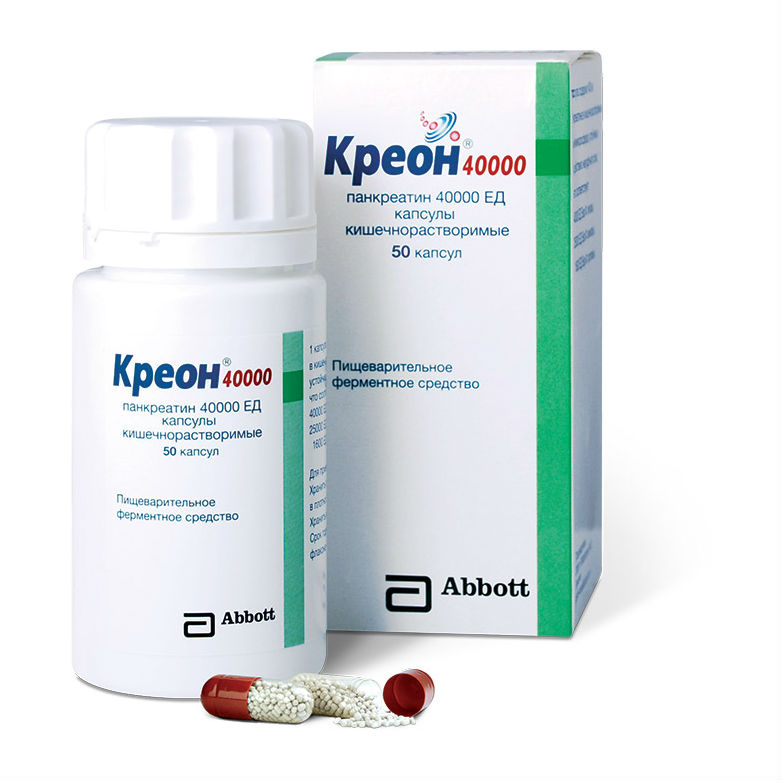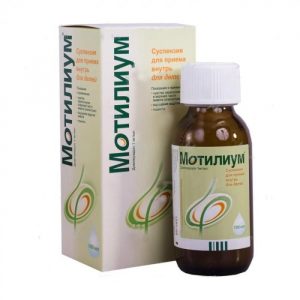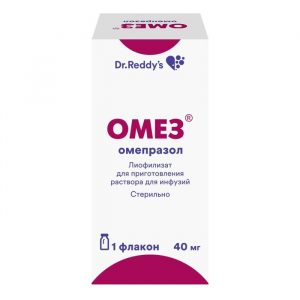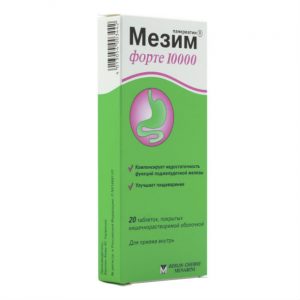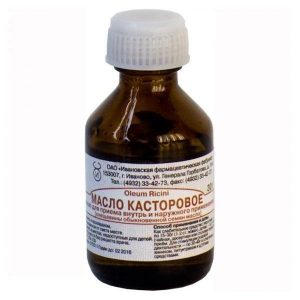Description
Release form
Capsules
Packing
50 pcs.
Pharmacological action
Creon is an enzyme preparation that improves digestion. Pancreatic enzymes that make up the drug, facilitate the breakdown of proteins, fats and carbohydrates, which leads to their complete absorption in the small intestine. Creon® 10000 contains pork pancreatin in the form of minimicrospheres, enteric coated (acid resistant), in gelatin capsules. Capsules dissolve quickly in the stomach, releasing hundreds of minimicrospheres. This principle was developed with the aim of thoroughly mixing minimicrospheres with intestinal contents, and, ultimately, better distribution of enzymes after their release inside the intestinal contents. When the minimicrospheres reach the small intestine, the enteric membrane rapidly collapses (at pH> 5.5), and enzymes with lipolytic, amylolytic and proteolytic activity are released, which leads to the breakdown of fats, carbohydrates and proteins. The substances obtained as a result of cleavage are then either absorbed directly or are further hydrolyzed by intestinal enzymes.
Pharmacokinetics:
In animal studies, a lack of absorption of intact (unsplit) enzymes was demonstrated, as a result of which no classical pharmacokinetic studies have been performed. Drugs containing pancreatic enzymes do not require absorption to manifest their effects. On the contrary, the therapeutic activity of these drugs is fully realized in the lumen of the gastrointestinal tract. According to their chemical structure, they are proteins and, therefore, when passing through the gastrointestinal tract, they undergo proteolytic cleavage until they are absorbed in the form of peptides and amino acids.
Indications
Substitution therapy for exocrine pancreatic insufficiency in children and adults due to various diseases of the gastrointestinal tract and most common in:
cystic fibrosis
chronic pancreatic
pancreatic pancreatic pancreatitis stomach (e.g., Billroth II)
obstruction of the pancreatic ducts or common bile duct (e.g. due to a neoplasm nii)
Schwachman – Diamond syndrome
condition after an attack of acute pancreatitis and the resumption of nutrition
To avoid complications, use only after consulting a doctor.
Contraindications
Hypersensitivity (including pork intolerance), acute pancreatitis, exacerbation of chronic pancreatitis.
Use during pregnancy and lactation
Pregnancy: There are no clinical data on the treatment of pregnant women with drugs containing pancreatic enzymes. In animal studies, absorption of porcine pancreatic enzymes was not detected, therefore, toxic effects on reproductive function and fetal development are not expected. Pregnant women should be prescribed with caution if the intended benefit to the mother outweighs the potential risk to the fetus.
Breastfeeding period: Based on animal studies, during which no systematic negative effect of pancreatic enzymes was detected, no adverse effect of the drug on the infant through breast milk is expected. During breastfeeding, pancreatic enzymes can be taken. If necessary, during pregnancy or breastfeeding, the drug should be taken in doses sufficient to maintain an adequate nutritional status.
Specific instructions
Icreatic strictures of the ileum, cecum, and colon (fibrosing colonopathy) are described in patients with cystic fibrosis who received high doses of pancreatin preparations. As a precaution, if unusual symptoms or changes in the abdominal cavity appear, a medical examination is necessary to exclude fibrosing colonopathy, especially in patients who take the drug at a dose of more than 10,000 lipase units / kg per day. Like all currently used preparations of porcine pancreatin, CreonВ® 10,000 is made from the pancreatic tissue of pigs specially grown for human consumption. Although the likelihood of transferring an infectious agent to humans has been minimized by checking and inactivating certain viruses during production, There is a theoretical risk of transmission of a viral disease, including diseases caused by new or unknown viruses. On thethe presence of swine viruses that can infect humans cannot be completely ruled out. However, over a long period of time using pig pancreatic extracts, not a single case of transmission of an infectious disease has been reported.
Composition
1 capsule contains:
active substance: pancreatin 400 mg
excipients: macrogol 4000, paraffin liquid, hypromellose phthalate, dimethicone 1000, dibutyl phthalate
capsule shell composition: iron oxide red (yellow) E2 (yellow) 2 (2) , iron oxide black (E172), titanium dioxide (E171), sodium lauryl sulfate, gelatin.
Dosage and administration of
Creon is taken orally, before meals, without chewing, with plenty of liquid, preferably alkaline: water, fruit juices. The dose is set individually depending on the severity of the digestive disorder. In the usual dose – 0.25-0.5 g 3-6 times a day immediately before meals or with meals. The duration of treatment is from several days (in case of digestive disorders due to errors in the diet) to several months and even years (if replacement therapy is necessary).
Side effects of
Gastrointestinal disorders
Very common (? 1/10): pain in the abdomen. Often (? 1/100, less than 1/10): nausea, vomiting, constipation, bloating, diarrhea. Frequency is unknown: ileum, cecum, and colon strictures (fibrosing colonopathy). Gastrointestinal disorders are mainly associated with the underlying disease. The incidence of adverse reactions such as abdominal pain and diarrhea, was lower or similar to placebo. Iliac, cecum, and colon strictures (fibrosing colonopathy) were observed in patients with cystic fibrosis who received high doses of pancreatin.
Disorders of the skin and subcutaneous tissue: Infrequently (? 1/1000, less than 1/100): rash. Frequency unknown: pruritus, urticaria.
Immune System Disorders: Unknown frequency: Hypersensitivity (anaphylactic reactions). Allergic reactions were observed mainly from the skin, but other allergy manifestations were also noted. Messages about these side effects were received during the period of post-marketing use and were spontaneous. There is insufficient data to accurately assess the incidence of cases. When used in children, no specific adverse reactions were noted. The frequency, type and severity of adverse reactions in children with cystic fibrosis were similar to those in adults.
Overdose of
Symptoms: hyperuricosuria and hyperuricemia.
Treatment: drug withdrawal, symptomatic therapy.
Storage Conditions
Do not store above 25 C in a tightly closed container. Keep out of reach of children!
Deystvuyuschee substances
Pancreatin
Pharmacy terms
OTC pdfproductfd4krd64prd docs199664pffdff14frd64prdpfdff14frd4pfrd4pffrd14frd4pffrd14pfff4dpfdcpfdcpdf Over-the-counter
Dosage form
capsules
